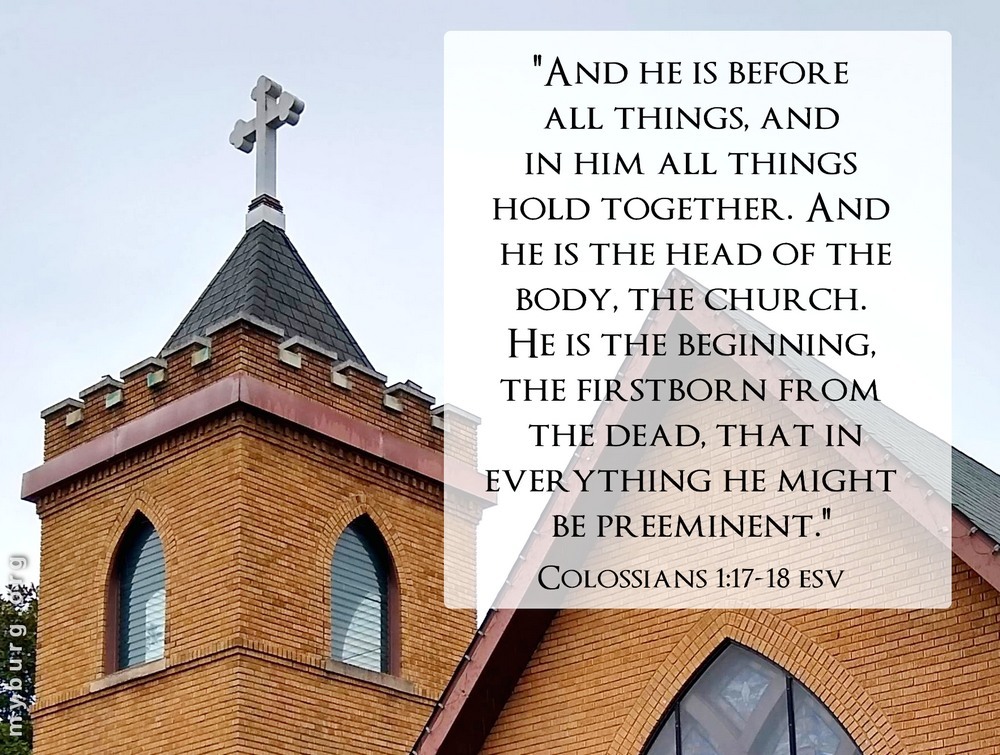bible reading mar 31 - apr 1

Bible reading for weekend March 31 -- April 1
Mar 31 -- Proverbs 18 and Colossians 1
Apr 1 -- Proverbs 19 and Colossians 2
"Death and life are in the power of the tongue, and those who love it will eat its fruits." (Proverbs 18:21)
THE POWER OF LANGUAGE. One of the most remarkable gifts that God gave us in creation was the gift of communication. With our thoughts and mouths we can communicate not only concrete realities but also abstract ideas. This is part of the image of God in man, since our God communicates (and creates) by spoken language. Truth itself is spoken reality. The tongue is an amazing organ, or tool, for both good and evil (Jas 3:1-10). An important part of wisdom is knowing when to speak and when to be silent, to whom to speak, and what to say and how to say it (Jas 1:19-20). Wisdom is not merely a matter of being silent, because some things really need to be said (see Psalms 32:3; 39:1-2). Words can bring death, but words are needed to bring life, as well. Jesus Christ himself is called "the Word" (John 1:1-14). At one point in Jesus' ministry, when many stopped following him because they found it difficult to accept his teaching (John 6:60-71), Jesus asked his disciples if they wanted to leave, too. Peter answered truthfully and wisely, "Lord, to whom shall we go? You have the words of eternal life..." (John 6:68). Our Lord's words -- received and believed -- change us forever. God's communication to us, the Bible, changes our consciousness daily as we read it, that is, it increases our understanding, insight, encouragement, and hope. "So faith comes from hearing, and hearing through the word of Christ" (Rom 10:17).
REFLECT. There are several broad themes in these chapters, including the need for companionship and the importance of work. But I counted about sixteen references to speaking or listening in these two chapters. So, as you read these proverbs, observe and make a list of what is being said about wisdom in speech. Here's the question: how can our speaking, as well as our listening and our silence, do good for others and bring glory to God?
================
"He is the beginning, the firstborn from the dead, that in everything he might be preeminent. For in him all the fullness of God was pleased to dwell..." (Colossians 1:18-19)
THE PRE-EMINENCE OF CHRIST (ch 1). Colossians is another of Paul's prison epistles, written from Rome (Acts 28:30) around AD 60-61. The opening prayer (vv 3-12) is an excellent example of what we can pray for one another. The theme of this epistle revolves around the pre-eminence of Christ. Being "firstborn" means he has first place in the universe (not that he was born, vv 15, 18). He is fully God, and the salvation he accomplished is completely sufficient for us. The words, "all, whole, every, full, fully, fullness" appear over 30 times in the first two chapters. We will need to grow in his grace, and mature in him, but we need no other Savior or Lord. We are complete in him (vv 13-14; 2:9-10). In Christ we have everything we need, and Christ in us is "the hope (sure expectation) of glory" (v 27).
THE COLOSSIAN HERESY (ch 2). The false teaching circulating among the Christians in Colossae was a mix of Jewish legalism and mysticism. Paul calls it a "self-made religion" (v 23), that combined asceticism, visions, and angel-worship. The implication of this teaching was that Jesus was not enough. Paul reiterates that in Christ are "hidden all the treasures of wisdom and knowledge" (v 3). All our sins are forgiven, and we are made alive in Christ, and filled with God. The Old Testament was a preparation, or the shadow of Christ, who is the reality and substance of our faith (vv 16-17). We do not need to climb some mystical ladder to the next angel, or avatar, or sensei, or master, or lord, but rather, we keep walking by faith in him: "Therefore, as you received Christ Jesus the Lord, so walk in him, rooted and built up in him and established in the faith, just as you were taught, abounding in thanksgiving" (vv 6-7).
JESUS OUR ALL-IN-ALL. All through the history of the church, there have been teachers (and movements) who taught, either plainly or by implication, that having Jesus was not enough. "You believe in Jesus, and that's good as far as it goes, but here's what else you need..." We do indeed grow in grace, and mature in Christ, but we do not go beyond Jesus. His salvation is complete, fully sufficient, and he himself is all we need. By faith we are complete in him. He is not only the way, but also our destination. Charles Spurgeon once wrote, "To be with Christ is to be in heaven, and to be in heaven is to be with Christ." He is all we need and want. Older evangelicals often used the term, "All-in-all", to describe Christ. To trust him completely is to find Jesus to be our All-in-all. Is he that to you?
About this newsletter: I post three times a week on my Bible reading, following the Robert Murray M'Cheyne (RMM) two-year reading schedule, as arranged by D. A. Carson. Scripture quotations, unless otherwise noted, are from The ESV® Bible (The Holy Bible, English Standard Version®), copyright © 2001 by Crossway, a publishing ministry of Good News Publishers. Used by permission. All rights reserved. Another resource I recommend is the NET Bible with its excellent notes at netbible.org.